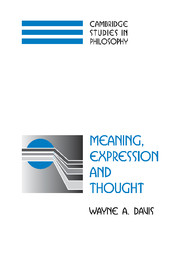Book contents
- Frontmatter
- Contents
- Preface
- 1 Introduction
- Part One Semantic Acts and Intentions
- Part Two Languages and Semantic Acts
- Part Three Thoughts and Ideas
- 12 Thought
- 13 Sentences, Propositions, and Thoughts
- 14 The Constituency Thesis
- 15 Ideas or Concepts
- 16 The Possession of Concepts
- 17 The Acquisition of Concepts
- 18 The Association of Ideas
- 19 Objects, Images, and Conceptions
- 20 The Language of Thought Hypothesis
- Part Four Ideational Theories of Meaning
- References
- Index
19 - Objects, Images, and Conceptions
Published online by Cambridge University Press: 20 July 2009
- Frontmatter
- Contents
- Preface
- 1 Introduction
- Part One Semantic Acts and Intentions
- Part Two Languages and Semantic Acts
- Part Three Thoughts and Ideas
- 12 Thought
- 13 Sentences, Propositions, and Thoughts
- 14 The Constituency Thesis
- 15 Ideas or Concepts
- 16 The Possession of Concepts
- 17 The Acquisition of Concepts
- 18 The Association of Ideas
- 19 Objects, Images, and Conceptions
- 20 The Language of Thought Hypothesis
- Part Four Ideational Theories of Meaning
- References
- Index
Summary
I argued in Parts I and II that the venerable formula “meaning consists in the expression of ideas” is true for the vast majority of expressions when the term “idea” denotes thoughts and their parts. I have devoted Part III to clarifying the notion of thought and ideation invoked in the expression theory, defending the assumption that thoughts have parts, and showing that occurrent thought plays an essential and distinctive role in the explanation of human behavior. I believe that the definition of “idea” and “concept” as denoting thoughts and their cognitive parts (Definition 15.1) is an accurate analysis of one of the standard meanings of these terms rather than an unconventional stipulation. Nonetheless, ever since the “new way of ideas” emerged with Hobbes, Descartes, and Locke, the terms “idea” and “concept” have been officially applied by philosophers, psychologists, and linguists to almost everything but thought-parts, including objects of thought, contents, images, words, inner speech, and conceptions or belief systems. Some of this usage seems to have been motivated by reductive theorizing, some by simple blindness. Nearly everyone who has used the terms “concept” and “idea” has done so inconsistently and unrigorously, defining them differently on different occasions or applying them when their official definition does not apply.
A man is thinking of the sky, on my analysis, provided a certain thought-part is occurring to him, namely, the idea of the sky. In general: S is thinking of Φ iff the idea of Φ is occurring to S (Definition 12.2).
- Type
- Chapter
- Information
- Meaning, Expression and Thought , pp. 481 - 518Publisher: Cambridge University PressPrint publication year: 2002



